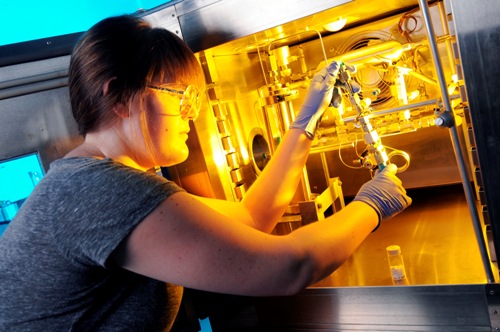Researchers from the Georgia Institute of Technology have shown the economic and chemical feasibility for extracting CO2 directly from air. They utilized new adsorbent materials in the novel method to capture CO2.

Stephanie Didas, a Georgia Tech Ph.D. candidate, loads an aminosilica sample into a custom-built volumetric adsorption system for measuring adsorption isotherms of different carbon dioxide capture materials. Credit: Gary Meek
The technique may also be used to capture CO2 from power plant flue gases. The captured CO2 may be used for improving oil recovery and for producing fuel from algae.
Coal-burning power plants and chemical facilities contribute to less than 50% of the global CO2 emissions. Transport vehicles such as planes, ships, trucks and buses account for the rest of the emissions and capturing these emissions are comparatively more expensive. According to the researchers, the operating costs involved were approximately $100 per ton when using a large CO2 removal unit that has the capacity to remove 1000 ton of CO2 per annum. Removal of CO2 from flue gas alone will not help address the global CO2 emissions. Air capture is required.
The atmosphere contains 400 ppm of CO2 while flue gases contain about 15%. The difference in capture efficiency and economic feasibility can be addressed by establishing CO2 removal units at sequestration locations.
The Georgia Tech researchers have modeled a batch extraction process that demonstrates economic feasibility. Dry amino-modified silica material is coated onto a ceramic honeycomb structure. The air is blown through the structure and the material captures the gas. Later steam is flown through the structure in order to release the gas.
The researchers have been conducting studies on metal-organic framework materials and have published papers in Journal of the American Chemical Society, ChemSusChem, and Industrial & Engineering Chemistry Research on alternate adsorbent materials.
Disclaimer: The views expressed here are those of the author expressed in their private capacity and do not necessarily represent the views of AZoM.com Limited T/A AZoNetwork the owner and operator of this website. This disclaimer forms part of the Terms and conditions of use of this website.